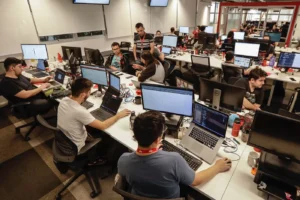Experts comment on how the use of technology and intelligent machines will transform jobs from now on
It may seem controversial, but the more machines there are among the workforce, the more it must be humanized. This is what experts interviewed by iFood News point out.
Automation is a path of no return, according to Luiz Fernando Barosa, consultant at business consultancy Deloitte. The data confirms: 70% of companies already use (or consider using) new technologies in their processes, but only 12% placed machines to do jobs that were previously done by people, according to the Global Human Capital Trends Deloitte 2020 survey.
“Technology did not come to 'steal' jobs, but to expand the workforce. If the machine performs a repetitive and exhaustive process with precision, there is more time for your team to develop skills that cannot be supplied by technology, such as creativity, ethical decision-making and collaboration between teams”, explains Luiz.
The majority of organizations interviewed (58%) responded in the survey that they focus the use of automation on increasing the consistency and quality of the final product or service.
Soon, we will have more robots as co-workers – and perhaps different job openings, ponders professor Flavio Tonidandel, coordinator of the robot engineering course at FEI.
“Robots must assist humans in the most diverse services. However, although some jobs may be reduced, many others arise with the need for new professionals, sometimes with higher qualifications. It will be up to society to retrain citizens who lost their jobs to robots so that they can work in other areas”, he reinforces.
For the academic, the future necessarily involves the use of smart robots in the most diverse sectors. “Autonomous cars, for example, are intelligent mobile robots that are already on the verge of revolutionizing society and global mobility.”
And it’s not even necessary to imagine such a distant scenario to find the “robots”. They are already in our daily lives. Technologies such as virtual reality, metaverse, chatbots and the wearables, like the smartwatches, have been with us for some time.
“In your pocket, your smartphone is a robot. With the social network filter, you use augmented reality to take a photo, download one or two applications a day and use it; you drones are already out there. All of this is part of these new technologies”, concludes Luiz.


